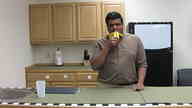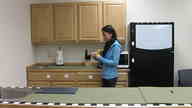










This dataset is available in a large zip file here. It's 4433 Megabytes. If you have trouble downloading it, I've also included links by activity. File sizes are approximate, provided mostly to help plan and debug long downloads.
NEW! By popular request, I've added background movies taken before each subject. I hope they help! They're here.
| answerPhone | 303 Megabytes |  |
| chopBanana | 676 Megabytes |  |
| dialPhone | 709 Megabytes |  |
| drinkWater | 946 Megabytes |  |
| eatBanana | 1207 Megabytes |  |
| eatSnack | 2174 Megabytes |  |
| lookupInPhonebook | 1577 Megabytes |  |
| peelBanana | 1020 Megabytes |  |
| useSilverware | 1238 Megabytes |  |
| writeOnWhiteboard | 680 Megabytes |  |
If you use this dataset, please cite:
Messing, R., Pal, C. & Kautz, H., 2009 "Activity recognition using the velocity histories of tracked keypoints" ICCV 2009. PDF BibTeX
Now Available: C++ code to find keypoints and extract their trajectories
Download Here.
This code is based on the Space-Time Interest Point (STIP) detector by Schuldt, Laptev, and Caputo. It uses their detector to find interest points, and a slightly modified KLT tracker (openCV implementation) to track them.
NEW:
Support scripts for these features, the ones I use to process them before I put them into the classification code below. Most of these are in Python, and some require the Python Imaging Library (PIL), OpenCV, or FFMpeg.
These scripts are available here.
I've also put together a kernelized version of the classification code described in our ICCV paper. This uses a kernelized k-means procedure that might best by thought of as a hard-clustering or Viterbi-parse version of the soft mixture model described in the paper. While the configuration file contains configuration flags for CUDA, this version is not CUDA-accelerated. That said, leave the tags in, or the code might crash. This is the code you want to use if you want to get a histogram of velocity-history codewords.
The kernelized clustering code is available here.
Coming soon: C, CUDA-accelerated code for supervised classification with mixture models over markov chains with augmentations.
Contact Ross Messing with any questions, comments, or requests.
If you use this code, please cite the papers mentioned in the README file.